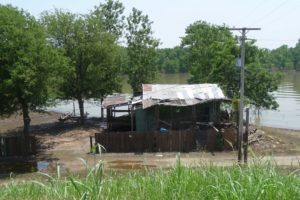CDFI fund forges hope for upward mobility in Mississippi Delta
The long-lasting poverty that afflicted the rural South after the Civil War, though alleviated in many areas, still stands in much of the Mississippi Delta. In 2018, Mississippi reported that 19.8% of the population lives under the poverty line, topping all other U.S. states. Despite this, almost half of the Delta’s poorest counties have experienced a decline in poverty rates over the last 30 years. In Coahoma County alone, the poverty rate dropped from 45% in 1990 to 36% in 2010. The Delta Regional Authority, a federal-state partnership that focuses on economic development, believes this is due in part to the 1994 creation of the Community Development Financial Institution Fund, a federal tax incentive in the New Market Tax Credit Program. The credit aids Community Development Entities (CDEs), which are private financial institutions such as banks that deliver affordable lending and credit services to low-income households and small businesses. Unlike many other financial institutions, CDEs do not emphasize the importance of credit scores, but rather aim to develop long-term relationships with community members through credit-building and financial literacy. In May 2019, 73 CDEs were awarded CDFI funds, and many hope that these institutions will help Delta communities strengthen their overall resilience.

Where many people in the U.S. lack financial resilience, CDEs can offer banking services in rural areas that are without them. In 2017, it was reported that 25% of U.S. households do not have adequate access to banks. Many cited not having enough money to open accounts or banks’ inconvenient locations. This rings true in the Delta, with more banks leaving the region than opening. This means that many families are unable to meet lender or creditor demands, which require bank account information to apply for a loan or mortgage. Additionally, in many cases low-income individuals have low credit scores, inhibiting them from securing loans from national banks, even if they do have an account. Furthermore, unbanked households do not have physical protection for their money. Without access to loans or money protection, many families are devastated by natural disasters such as hurricanes, leaving them incredibly financially vulnerable.
However, the introduction of CDEs has mitigated the effects of these obstacles. Due to the freedom the CDFI Fund offers them, CDEs can offer loans such as a low-cost mortgages to those who make under $30,000 a year, which is typically a cut-off mark for national banks. In Humphreys County, MS, a CDE known as Guaranty Bank & Trust was recently awarded $2.5 million from the Fund. This bank offers a wide array of financial services to low-income households, including home loans and free courses on financial literacy. Due to this freedom, CDEs are able to offer services other financial institutions traditionally would not. An example of such is the Hope Enterprise Development Corporation, a loan fund organization located south of Humphreys County in the town of Moorhead. The CDE was awarded $90 million to create a think tank to craft a socially inclusive policy response in the wake of Hurricane Katrina, which ended up providing more than $600 million in repair funds. Moreover, CDEs not only offer services to communities, but help to strengthen them on an individual and customized basis. In Marks, MS, Louisiana-based Shreveport Federal Credit Union offers some home loans and specialized services for black farmers, even creating the Delta Regional Mule Train Farmers Market, a large building rented by a cooperative of farmers from the county for one dollar a year. These efforts are helping to create resilient communities all over the Delta.
CDEs allow families and communities to build multiple types of resilience. When offered a house loan, families are allowed to move into higher-opportunity communities, which has been shown to correlate with a higher future income of young children. Combined with the stability of learning to save money, which is taught in financial literacy classes, families are better able to be financially flexible in the case of a natural disaster or unforeseen hardship, such as a cut to educational funding, such as after school programs or subsidized lunches. Additionally, many of the communities that CDEs operate in are food deserts, which are areas where it is difficult to find fresh produce due to a lack of supermarkets and healthy food providers. Loans to low-income households can enable families to access transportation and inexpensive fresh food, improving the health of the community as a whole, particularly children. Further, by lending to local farmers, farming families can simultaneously expand their businesses’ operations and reduce the commute time of low-income families to a grocery store for fresh produce. In the event of an outbreak of disease, the residents of these communities will have stronger immune systems and healthier bodies, allowing them to be more resilient to illness. The access of low-income families to reliable financial services is helping to break the cycle of poverty and debt in Delta communities, forging hope for upward mobility and financial resilience.
Sources and Additional Reading
Mississippi 2018 Report – Talk Poverty
Banking on Justice: Climbing Out of Poverty in the Mississippi Delta – Jackson Free Press
What is a CDFI? – Opportunity Finance Network
Drawbacks of Not Having a Bank Account – U.S. News
2017 FDIC National Survey of Unbanked and Underbanked Households – Federal Deposit Insurance Corporation
Surrounded by crops, lacking food: A health paradox in the Mississippi Delta – Clarion Ledger
USDA Defines Food Deserts – American Nutrition Association
How do neighborhoods affect economic opportunity? – The Equality of Opportunity Project
The Effects of Exposure to Better Neighborhoods on Children – The Equality of Opportunity Project
After school program funding slashed by $9M – Mississippi Today
Amid Shutdown, Schools Worry Meal Programs Will Run Out of Cash – Wall Street Journal
Can Mississippi schools get ahead after a new round of budget cuts? – PBS
Food Deserts and Childhood Obesity: Is There a Connection? – Agricultural & Applied Economics Association
